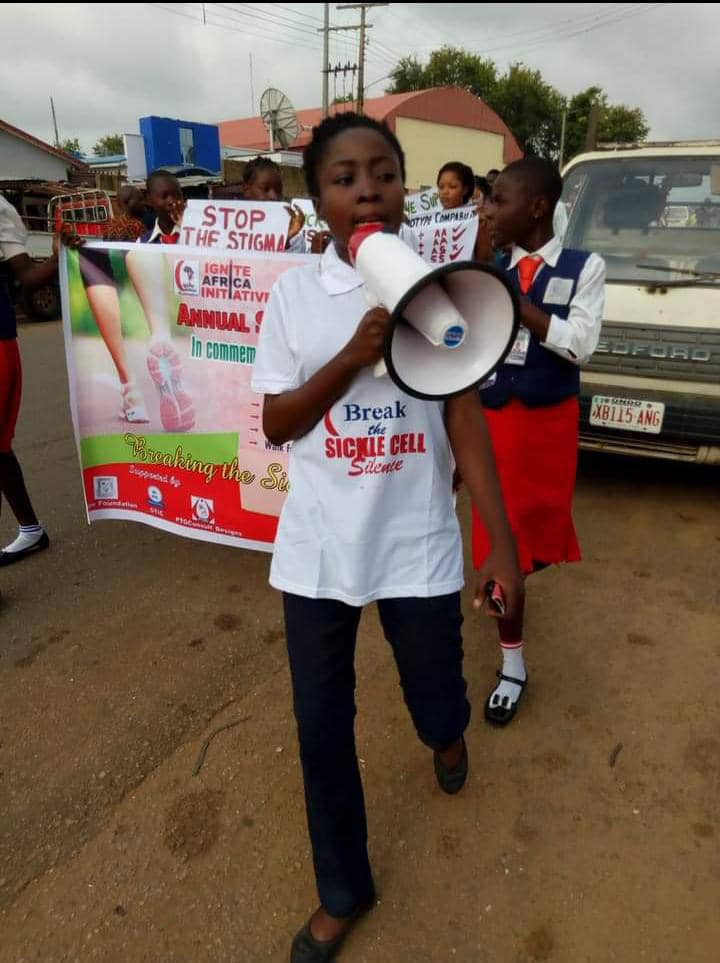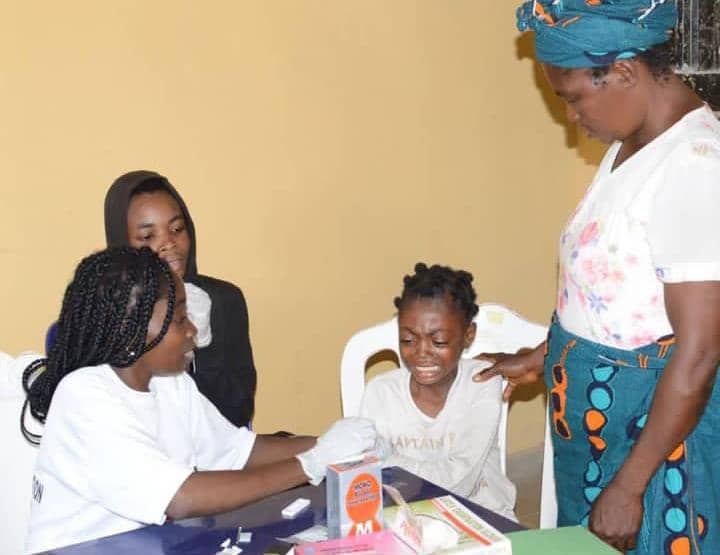Sickle cell anaemia, a genetic disorder affecting red blood cells, poses significant obstacles for those living with it. The excruciating pain, life-threatening complications, and constant struggle to maintain a semblance of normalcy can be overwhelming.
Yet, in the midst of it all, Oluwakemi Oguntimehin has been a beacon of hope for survivors of the condition. She shares her journey as a sickle cell warrior and her selfless contributions to helping others.
My name is Oluwakemi Oguntimehin, an indigene of Idanre in Ondo State. I was born and bred in Ikare Akoko, and I am the last child in the family.
The significant thing about my birth is that I was born with a genetic disorder that causes my red blood cells to die quickly. In other words, I have sickle cell disorder.
I wanted to study medicine, but I was told that medical school is very stressful, and stress often triggers a crisis
While growing up, I was always in and out of the hospital due to my health crisis. Initially, my parents didn’t understand why I was always sick and pale. When my genotype was checked, it was wrongly diagnosed as AA. So, for many years, my family assumed that my sickness was due to a spiritual attack.
However, at some point, another genotype test was done, and the doctors confirmed the presence of sickle cell anemia. It wasn’t a piece of good news for the family, but at least, we were relieved of the superstitious assumption that an enemy was responsible for my health crisis.
Education
The first school I attended was Auntie Bisi Nursery and Primary School in Ugbe Akoko, Ondo State. Then I proceeded to Winners College, also in Ugbe, Akoko.
As a child, I wanted to study medicine and surgery, but I was discouraged from pursuing my dreams. At that time, there was no nearby institution offering the course, and my parents were afraid to send me to a faraway school.
Secondly, I was told that medical school is very stressful, and stress often triggers a crisis. After so much consideration, I had to study Biochemistry at Adekunle Ajasin University, Akungba-Akoko, Ondo State.
My genotype was wrongly diagnosed as AA. So, for many years, my family assumed that my sickness was spiritual attack
Living with sickle cell anaemia
In simple terms, living with sickle cell disease is very challenging, especially if you are poorly informed about how to manage the condition. Back then, I wondered why I had to go through so much pain.
I felt like a burden to my family because they were spending so much money on drugs, blood transfusions and other medical expenses — the same money that would have been used to cater for my siblings.
I still remember those days when I used to cry out to God to help me. At the same time, many negative thoughts were always running through my head. I wanted to blame my parents for bringing me into this world to suffer, but I couldn’t. They were already married before they realized that they were both carriers of the sickle cell trait.
While I was dealing with my health challenge, I also had to deal with discrimination and stigmatization from people. I am that child that some parents advised their children not to play with. I was bullied and called names like abiku– a Yoruba term used for a child that dies and is reborn.
Whenever I walked past, people used to talk behind my back. Even some pregnant women in my community were always avoiding me because they believed that I would bring bad luck to their unborn baby.
When I got older, the stigmatization didn’t end. As a student, I was almost denied hostel accommodation because of my condition. My love life was also affected. I once met a guy who said to me, “Kemi, I like you a lot. You are beautiful and hardworking, and you have a very good heart. However, I can’t date you because you have sickle cell anemia.” When he said that, I looked at him, smiled, and walked away.
While I was dealing with my health challenge, I also had to deal with discrimination and stigmatization
There is another guy who said he heard that having sex with a sickle cell patient can trigger crises. All these are examples of the misconceptions people have about the condition.
For many years, I couldn’t interact with outsiders, and I lived a lonely life. My mental health was badly affected, and that is why I attempted to kill myself. I didn’t do it once, but twice. I wanted to be free from both emotional and physical pain. However, God didn’t allow me to die, instead, He guided me into discovering my purpose in life.
Becoming a sickle cell warrior
According to late Kofi Annan, the former Secretary-General of the United Nations, “knowledge is power, and information is liberating.” I enjoy reading a lot, and fortunately, I found a blog that provided answers to all my questions on sickle cell anaemia.

I also found tips on how to live a healthy life as a sickle cell warrior. When I started practising those tips and taking my drugs, I noticed that my health status improved and my hospital visits reduced tremendously.
A guy told me, ‘ Kemi, I like you a lot. You are beautiful and hardworking. But I can’t date you because you have sickle cell anemia’
After that, the next thing I did was work on my mindset. I stopped focusing on my sickle cell disorder and learned to accept myself for who I am. So, that was how I became outspoken and started building relationships with people.
Due to my experience, I felt the need to educate people about sickle cell disease and fight the stigma. There are many children in rural areas who are suffering from this condition, but their caregivers are not aware of it. So, instead of offering them good medical treatment, they take the children to herbalists or pastors for deliverance sessions.
After considering the negative impact of the misconceptions about sickle cell anemia, I started a foundation called the Ignite Sickle Cell Initiative.
I attempted to kill myself twice. I wanted to be free from both emotional and physical pain
The Ignite Sickle Cell Initiative (ISCI)
This is a non-profit organization dedicated to education, empowerment, and awareness about sickle cell disease. Our main goal is to change the narrative that says people living with sickle cell hardly survive to adulthood. I am above 30 years old and I am full of life.

Also, the foundation has organized awareness campaigns in over 14 communities in Nigeria. Although our office is located at Ikare, Ondo State, we often host health professionals from different states. One of our goals is to expand our reach to more regions.
I practise health tips that I’ve learnt and regularly take my drugs. So, my health has improved and my hospital visits have reduced tremendously
Challenges
The major challenge we are experiencing is the lack of enough financial support. There are many people who like what we are doing but they don’t have money to support the foundation. And it is very difficult to receive grants from the government. We are just hoping that things will get better with time.
Self-fulfilling moments
Contrary to popular opinion, sickle cell anemia is not a death sentence. By the grace of God, we have touched the lives of many children and restored hope to their families. It gives me joy whenever I see our warriors looking healthier and stronger.
The work I do at the Ignite Sickle Cell Initiative has also influenced me positively. I no longer feel bad whenever I’m rejected; instead, I speak up against stigmatization.
the same me who was not allowed to travel far from home is now touring different countries and chasing her dreams
Awards and recognitions
When I started this journey of advocacy, I never thought about receiving awards and recognitions; but today, I am happy to say that I have received some from different organizations. And I believe more awards will come.
Leisure
When I’m not working, I relax by reading novels. I’m not a movie fan. One of my favorite books is The Richest Man in Babylon by George Samuel Clason. Also, if I got the opportunity to meet a popular figure one-on-one, I would love to meet Oprah Winfrey. She is a woman I admire for her strength and character.
Final word
Whenever I reminisce on everything that has happened in my life, I always tell myself that God loves me so much. Did you know that the same girl who was not allowed to travel far from home is now touring different countries and chasing her dreams?
If I can do it, then you can. You can be anything that you want to be. Just stay away from naysayers and focus on your dreams. Even if no one is supporting you, JUST GO FOR IT! I am rooting for you and I believe that one day, your success will attract kings to you. So, until then, be happy and keep surviving.


